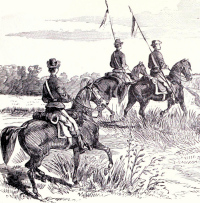Camp Asboth, near Tipton, October 11th. For the last twenty-four hours it has rained violently, and the prairie upon which we are encamped is a sea of black mud. But the tents are tight, and inside we contrive to keep comparatively warm.
The camp is filled with speculations as to our future course. Shall we follow Price, who is crossing the Osage now, or are we to garrison the important positions upon this line and return to St. Louis and prepare for the expedition down the river? The General is silent, his reserve is never broken, and no one knows what his plans are, except those whose business it is to know. I will here record the plan of the campaign.
Our campaign has been in some measure decided by the movements of the Rebels. The sudden appearance of Price in the West, gathering to his standard many thousands of the disaffected, has made it necessary for the General to check his bold and successful progress. Carthage, Wilson’s Creek, and Lexington have given to Price a prestige which it is essential to destroy. The gun-boats cannot be finished for two months or more, and we cannot go down the Mississippi until the flotilla is ready; and from the character of the country upon each side of the river it will he difficult to operate there with a large body of men. In Southwestern Missouri we are sure of fine weather till the last of November, the prairies are high and dry, and there are no natural obstacles except such as it will excite the enthusiasm of the troops to overcome. Therefore the General has determined to pursue Price until he catches him. He can march faster than we can now, but we shall soon be able to move faster than it is possible for him to do. The Rebels have no base of operations from which to draw supplies; they depend entirely upon foraging; and for this reason Price has to make long halts wherever he finds mills, and grind the flour. He is so deficient in equipage, also, that it will be impossible for him to carry his troops over great distances. But we can safely calculate that Price and Rains will not leave the State; their followers are enlisted for six months, and are already becoming discontented at their continued retreat, and will not go with them beyond the borders. This is the uniform testimony of deserters and scouts. Price disposed of, either by a defeat or by the dispersal of his army, we are to proceed to Bird’s Point, or into Arkansas, according to circumstances. A blow at Little Rock seems now the wisest, as it is the boldest plan. We can reach that place by the middle of November; and if we obtain possession of it, the position of the enemy upon the Mississippi will be completely turned. The communications of Pillow, Hardee, and Thompson, who draw their supplies through Arkansas, will be cut off, they will be compelled to retreat, and our flotilla and the reinforcements can descend the river to assist in the operations against Memphis and the attack upon New Orleans.
This campaign may be difficult, the army will have to encounter hardships and perils, but, unless defeated in the field, the enterprise will be successful. No hardships or perils can daunt the spirit of the General, or arrest the march of the enthusiastic army his genius has created.
Our column is composed of five divisions, under Generals Hunter, Pope, Sigel, McKinstry, and Asboth, and numbers about thirty thousand men, including over five thousand cavalry and eighty-six pieces of artillery, a large proportion of which are rifled. The infantry is generally well, though not uniformly armed. But the cavalry is very badly armed. Colonel Carr’s regiment has no sabres, except for the commissioned and non-commissioned officers. The men carry Hall’s carbines and revolvers. Major Waring’s fine corps, the Fremont Hussars, is also deficient in sabres, and some of the companies are provided with lances,–formidable weapons in skilful hands, but only an embarrassment to our raw troops.
Lane and Sturgis are to come from Kansas and join us on the Osage, and Wyman is to bring his command from Rolla and meet us south of that river.
Paducah, Cairo, Bird’s Point, Cape Girardeau, and Ironton are well protected against attack, and the commanders at those posts are ordered to engage the enemy as soon as we catch Price; and if the Rebels retreat, they are to pursue them. Thus our expedition is part of a combined and extended movement, and, instead of having no purpose except the defeat of Price, we are on the road to New Orleans.
Next Monday we are to start. Asboth will go from here, Hunter by way of Versailles, McKinstry from Syracuse, Pope from his present position in the direction of Booneville, and Sigel from Sedalia. We are to cross the Osage at Warsaw; and as Sigel has the shortest distance to march, he is expected to reach that town first.
Precious time has already been lost because of a lack of transportation and supplies. Foraging parties have been scouring the country, and large numbers of wagons, horses, and mules have been brought in. This property is all appraised, and when taken from Union men it is paid for. In doubtful cases a certificate is given to the owner, which recites that he is to be paid in case he shall continue to be loyal to the Government. We thus obtain a hold upon these people which an oath of allegiance every day would not give us.
Fremont’s Hundred Days in Missouri was published in three installments in The Atlantic Monthly. The anonymous author appears to have been a member of Fremont’s staff with a disdainful bias towards Missourians, even those who were pro-Union.
